选修六 语言点正误辨析
选修6第4单元词语辨析
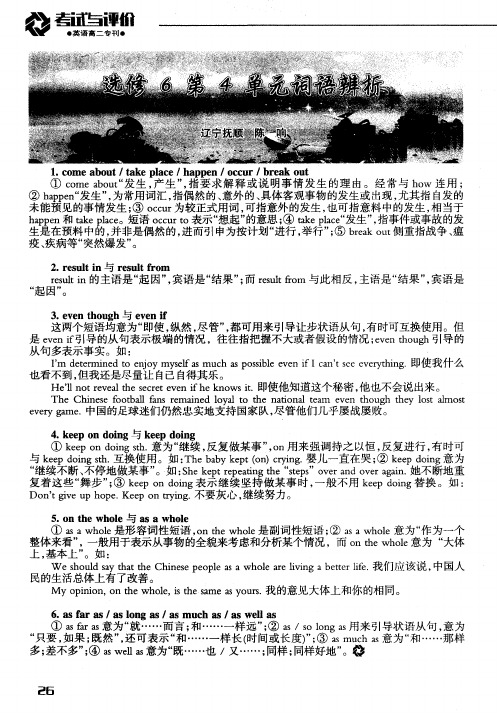
①a s a w h o l e 是形容词性短语 , o n t h e w h o l e 是副词性短语 ; ② a s a w h o l e意为“ 作为一个 整体来看 ” , 一般用于表示从事物的全貌来考虑和分析某个情况 ,而 o n t h e w h o l e 意为 “ 大体 上, 基本 上 ” 。如 : We s h o u l d s a y t h a t t h e C h i n e s e p e o p l e a s a wh o l e a r e l i v i n g a b e t t e r l i f e . 我们 应 该说 , 中 国人 民的生活总体上有了改善 。 My o p i n i o n , o n t h e w h o l e , i s t h e s a m e a s y o u r s . 我 的意见大体上和你 的相同。
Th e Ch i ne s e f o ot ba l l f a ns r e ma i ne d l o ya l t o t he na t i o n l a t e a m e v e n t h o ug h t he y l o s t lmo a s t
6 . a s f a r a s| f t s l o n g a s| a s mu c h s | a s a we l l a s
“ 起 因” 。
3 . e v e n t h o u g h与 e v e n i f
这两个短语均意为“ 即使 , 纵然 , 尽管” , 都可用来引导让步状语从句 , 有时可互换使用 。但 是e v e n i f 引 导 的从 句表 示极 端 的情 况 ,往 往 指把 握不 大 或者 假设 的情况 ; e v e n t h o u g h引导 的 从句 多表 示 事实 。如 : I ' m d e t e r mi n e d t o e n j o y my s e l f a s mu c h a s p o s s i b l e e v e n i f I c a n ’ t s e e e v e r y t h i n g . 即使 我什 么 也看不到 , 但我还是尽量让 自己 自 得其乐。 H e ’ 1 1 n o t r e v e a l t h e s e c r e t e v e n i f h e k n o w s i t . 即使他知道这个秘密, 他也不会说出来 。
英语选修6复习(重点句子赏析+重点语法)
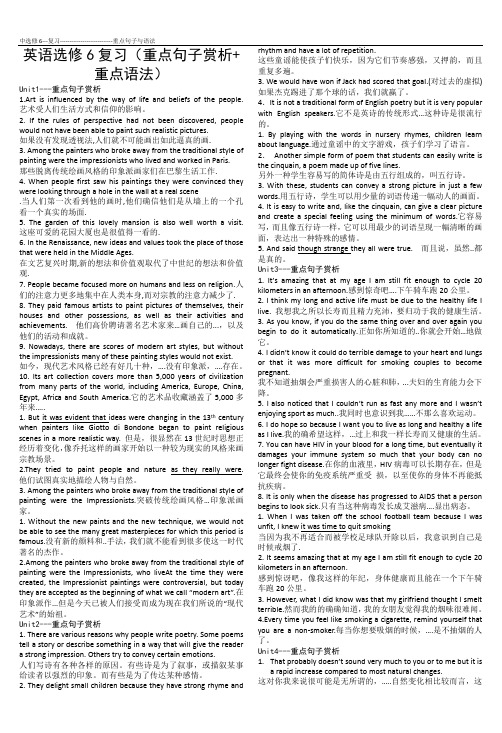
英语选修6复习(重点句子赏析+重点语法)Unit1---重点句子赏析1.Art is influenced by the way of life and beliefs of the people. 艺术受人们生活方式和信仰的影响。
2. If the rules of perspective had not been discovered, people would not have been able to paint such realistic pictures.如果没有发现透视法,人们就不可能画出如此逼真的画.3. Among the painters who broke away from the traditional style of painting were the impressionists who lived and worked in Paris.那些脱离传统绘画风格的印象派画家们在巴黎生活工作.4. When people first saw his paintings they were convinced they were looking through a hole in the wall at a real scene.当人们第一次看到他的画时,他们确信他们是从墙上的一个孔看一个真实的场面.5. The garden of this lovely mansion is also well worth a visit. 这座可爱的花园大厦也是很值得一看的.6. In the Renaissance, new ideas and values took the place of those that were held in the Middle Ages.在文艺复兴时期,新的想法和价值观取代了中世纪的想法和价值观.7. People became focused more on humans and less on religion.人们的注意力更多地集中在人类本身,而对宗教的注意力减少了. 8. They paid famous artists to paint pictures of themselves, their houses and other possessions, as well as their activities and achievements. 他们高价聘请著名艺术家来…画自己的...,以及他们的活动和成就。
高三英语选修六的知识点分析归纳

高三英语选修六的知识点分析归纳英语基础知识的复习要以课本为纲,按照知识之间的内在联系,将它们进行分类整理.在这个过程中,要注意以新带旧,使初中和高中所学的知识形成系统,总结出规律性,这样才能融会贯通,也才能把知识转化为能力.以下是小编给大家整理的高三英语选修六的知识点分析归纳,希望能帮助到你!高三英语选修六的知识点分析归纳1英语中过去分词可作宾补,(此时的过去分词一般是及物动词)表被动意义或完成意义,有时两者兼而有之。
做宾补的过去分词与宾语有逻辑上的动宾关系,即宾语是过去分词动作的对象。
如:She found the door broken in when she came back.(宾补与宾语有被动的关系,表一种状态。
)一. 过去分词用在表状态的动词keep,leave等的后面。
Eg:They kept the door locked for a long time.Keep your mouth shut and your eyes open.(谚语:少说多看) Don't leave such an important thing undone.Don't leave the windows broken like this all the time.二.过分词用在get,have,make, 的后面。
1.注意“have +宾语+过去分词”的两种情况:A)表"让某人做某事/让某事(被人)做"eg: I have had my bike repaired.The villagers had many trees planted just then.B)表"遭遇到某种不幸,受到打击/受....影响,蒙受..... 损失"Eg:I had my wallet stolen on a bus last month.The old man had his leg broken in the accident.He had his leg broken in the match yesterday.(MET1986)2."make+宾语+过去分词",在这种结构中,过去分词的动词必须是表示结果含义的。
高二英语选修六unit 4语言点
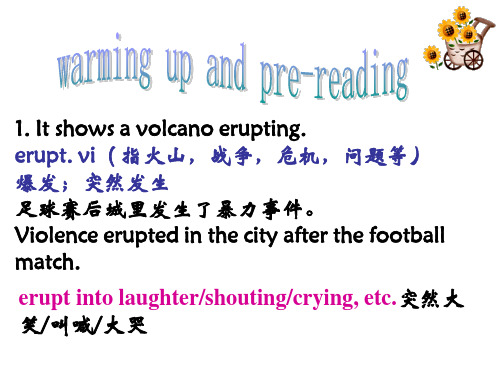
5 Unfortunately, we can’t move their homes out of the way and many houses have been covered with lava or burned to the ground. 1)unfortunate. adj. 不幸的,倒霉的 归纳拓展: unfortunate. adj. 不合适的;不恰当的;令人遗憾的 unfortunately. adv. 遗憾地,不幸地 fortunate adj. 交好运的,带来好运的;幸运的 fortune. n. 机会;运气;命运;财产 make a fortune 发财 try one’s fortune 外出找出路 He went to the west and _____ a fortune soon by selling cars. A. received B. found C. made D. searched
•9. Having earlier collected special clothes from the observatory ,we put them on before we went any closer . •We waited a long time before the train arrived . 我们等了很长时间火车才到达. ...... 才
选修6Module6辨析

1.abandon与desert
单词
辨析
例句
abandon
强调“完全、永远地遗弃”,尤指遗弃以前感兴趣或负有责任的人或物
They were accused of abandoning their socialist principles.
desert
强调“违背誓言、命令、责任、义务等”,指“抛弃自己的义务”
regardless of
为介词短语,后接名词、代词、动名词或what从句,表示“对……熟视无睹,置若罔闻”
The law requires equal treatment for all, regardless of race, religion, or sex.
although
为连词,“虽然;尽管”,引导让步状语从句
6.remain与stay
单词
辨析
例句
remain
指在别人已离去或事情有变动后,仍然继续停留,或保持原来的状态、关系、行动等,主语可以是人,也可以是物
When the others had gone, he remained and put back the chairs.
stay
表示某人在某处停留、逗留
You can copy down my answers, although I’m not sure whether they’re right.
Mike just deserted her when she got pregnant.
2.announce与declare
单词
辨析
例句
announce
指正式地“公开,发表,宣布”,侧重“预告”人们所关心或感兴趣的事情,尤指新闻、消息等
选修6第3单元词语辨析
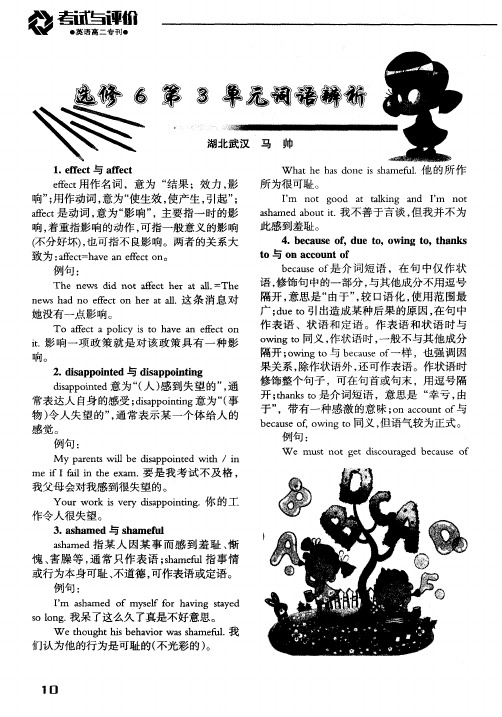
i t . 影 响 一 项 政 策 就 是 对 该 政 策 具 有 一 种 影 响。 2 . d i s a p p o i n t e d与 d is a p p o i n t i n g d i s a p p o i n t e d意 为 “ ( 人) 感 到 失望 的 ” , 通 常 表 达人 自身 的感受 ; d i s a p p o i n t i n g 意为“ ( 事
愧、 害臊 等 , 通常 只作 表语 ; s h a me f u l 指事情 或行为本身可耻 、 不道德 , 可作表语或定语 。 例旬 :
I ' m a s h a me d o f my s e l f f o r ha v i ng s t a y e d
S O l o n g . 我呆 了这么 久 了真是 不 好意 思 。 We t h o u g h t h i s b e h a io v r Wa S s h a me f u 1 . 我 们 认 为他 的行 为是 可耻 的( 不光 彩 的 ) 。
Yo u r wo r k i s v e r y is d a p p o i n t i n g . 你 的工 作 令 人很 失望 。 3 . a s h a me d与 s h a me f u l a s h a me d指 某 人 因某 事 而 感 到 羞 耻 、 惭
Th e n e wg d i d n o t a f e c t h e r a t a l 1 . = Th e
Wh a t h e h a s d o n e i s s h a me f u 1 . 他 的 所 作 所 为很 可耻 。
誊 武
偷
●英语 高 二专 千 Ⅱ ●
高中英语知识点归纳语法错误的辨析和改正方法
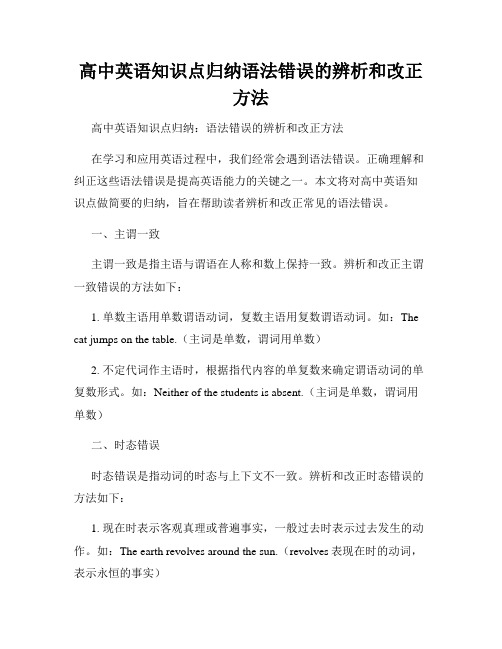
高中英语知识点归纳语法错误的辨析和改正方法高中英语知识点归纳:语法错误的辨析和改正方法在学习和应用英语过程中,我们经常会遇到语法错误。
正确理解和纠正这些语法错误是提高英语能力的关键之一。
本文将对高中英语知识点做简要的归纳,旨在帮助读者辨析和改正常见的语法错误。
一、主谓一致主谓一致是指主语与谓语在人称和数上保持一致。
辨析和改正主谓一致错误的方法如下:1. 单数主语用单数谓语动词,复数主语用复数谓语动词。
如:The cat jumps on the table.(主词是单数,谓词用单数)2. 不定代词作主语时,根据指代内容的单复数来确定谓语动词的单复数形式。
如:Neither of the students is absent.(主词是单数,谓词用单数)二、时态错误时态错误是指动词的时态与上下文不一致。
辨析和改正时态错误的方法如下:1. 现在时表示客观真理或普遍事实,一般过去时表示过去发生的动作。
如:The earth revolves around the sun.(revolves表现在时的动词,表示永恒的事实)2. 动词的完成时态表示动作发生在过去某个时间前完成。
如:I have finished my homework.(have finished表示完成时态)三、形容词和副词的用法形容词用于修饰名词,副词用于修饰动词、形容词或者其他副词。
辨析和改正形容词和副词的用法错误的方法如下:1. 形容词用于修饰名词,副词用于修饰动词。
如:She is a quick learner.(quick修饰名词learner)2. 形容词修饰不定代词时,形容词要放在不定代词的后面。
如:He is someone special.(special修饰不定代词someone)四、冠词的用法冠词用于指定名词的范围、数量或者特定程度。
辨析和改正冠词用法错误的方法如下:1. 定冠词“the”用于指定特定的或已知的名词,不定冠词“a/an”用于指定泛指的名词。
六年级语法技巧常见错误点一网打尽

六年级语法技巧常见错误点一网打尽在学习语法的过程中,很多六年级学生经常会遇到一些常见的错误。
这些错误可能会导致语法不准确,进而影响整体阅读和写作能力。
本文将针对六年级语法技巧中的常见错误点进行全面的梳理和解析,帮助学生更好地掌握语法知识。
错误点一:主谓一致问题在句子中,主语和谓语之间应该保持一致。
然而,许多学生经常因为主谓不一致而犯错。
例如,“The key to success are hard work and determination.”正确的写法应该是“The key to success is hard work and determination.” 这里的主语是“The key”,所以动词应该用单数形式。
错误点二:时态与语态混淆时态和语态是语法中极易混淆的概念。
很多学生常常会在句子中错误地使用时态和语态。
一种常见的错误是在过去时态的情况下使用了现在时态的动词。
例如,“Yesterday, I goes to the park.” 正确的写法应该是“Yesterday, I went to the park.” 这里的动词应该是过去式的“went”,而不是现在式的“goes”。
错误点三:冠词的误用冠词在英语语法中占据重要地位,但也是造成许多学生混淆的一个问题。
一个常见的错误是不正确使用定冠词“the”。
例如,“I saw a birdin tree.” 正确的写法应该是“I saw a bird in the tree.” 这里的冠词“the”用来指特定的树。
错误点四:代词的指代问题代词的指代问题也是六年级学生常犯的一个错误。
有时他们没有准确地指代前文中的名词,导致句子不清晰或不连贯。
例如,“Amy borrowed a book from the library. She is very interesting.” 正确的写法应该是“Amy borrowed a book from the library. It is very interesting.” 这里的“it”指代前文中提到的书籍。
六年级语文课程复习之常见语法错误与修正技巧

六年级语文课程复习之常见语法错误与修正技巧1. 主谓一致错误:主谓一致是语法中最基本的规则之一,主语和谓语动词在人称和数上要保持一致。
以下是一些常见的主谓一致错误及其修正技巧:示例一:错误:我的朋友每天都饭后看新闻。
修正:我的朋友每天都看新闻。
示例二:错误:孩子们在操场上玩得开心。
修正:孩子们在操场上玩得开心。
2. 时态错误:正确使用时态能够准确地表达动作的发生时间和顺序。
以下是一些常见的时态错误及其修正技巧:示例一:错误:我去公园和朋友玩了昨天。
修正:昨天我和朋友一起去了公园玩。
示例二:修正:明天我要写作业。
3. 代词错误:代词在句子中用来替代特定的名词,要确保代词和原名词在性、数、格等方面一致。
以下是一些常见的代词错误及其修正技巧:示例一:错误:李明喜欢足球,因为它可以锻炼身体。
修正:李明喜欢足球,因为足球可以锻炼身体。
示例二:错误:在我的书包里,我放了一个她的钢笔。
修正:在我的书包里,我放了一个我的钢笔。
4. 冠词错误:冠词用于限定名词,要根据名词的性质和语境正确选择冠词。
以下是一些常见的冠词错误及其修正技巧:示例一:错误:请给我一些苹果。
修正:请给我一颗苹果。
示例二:修正:她是躺在床上的。
5. 并列句错误:并列句是由两个或多个并列的分句组成的句子,要确保这些分句在结构上平衡且意义上相关。
以下是一些常见的并列句错误及其修正技巧:示例一:错误:我喜欢唱歌,而他喜欢踢足球。
修正:我喜欢唱歌,他喜欢踢足球。
示例二:错误:她喜欢吃水果,但是我喜欢吃蔬菜。
修正:她喜欢吃水果,我喜欢吃蔬菜。
6. 介词错误:介词用于表示名词与其他成分之间的关系,要注意正确使用常用的介词。
以下是一些常见的介词错误及其修正技巧:示例一:错误:我上学早,总是在7点起床。
修正:我上学早,总是在7点之前起床。
示例二:错误:我喜欢和朋友们一起学习。
修正:我喜欢和朋友们一起学习。
通过以上的讲解和示例,我们可以更好地理解和掌握常见的语法错误及其修正技巧。
译林高二英语精源课件:选修6 短文改错复习教学课件

of wood in ∧many fields. the
∧
(3)错词现象:主要表现在错 误使用冠词、介词、名词 单复数、动词时态、非谓 语动词、代词、连词、词 形(用动词、名词 、还是
形容词)等,或主谓不一 致,或在平行结构中用错 词的形式。
短文改错解题时应注意
四 不 改
a. 单词拼写 b. 大小写 c. 语序错误 d. 标点符号
介词多半考搭配,多、漏、误用想周到。
改
句法涉及到“一致”,从句多考关系词。
错
见到代词或指代,指代通常不合理。
词法句法均未错,逻辑推理去寻找。
口
熟记“811定律”,回读复查敲定稿。
诀
习题练习
thought
When I was a child, I hoped to live in
the city. I think I
▪ Would you like repeat it again? ▪ He returned back to the school at
6:00pm. ▪ We should serve for the people. ▪ We entered into the room.
▪ Helen married with John.
industrialization, the environment has been polluted. Lots of
studies have been shown that warming
One day, little Tony went to a shopping
cepanretnetsr wiyh
in
his parent. It was very crowded. Tony saw a toy
人教课标版高二英语选修6名师汇编:Unit4词语辨析精讲练及单元词汇串记

名师汇编:Unit4词语辨析精讲练1). consequence/result/effect/outcome【解释】consequence强调因某件事而引起的后果,有时带贬义。
result普通用语,指某行动,计划或事件带来的最终结果。
effect与相对,指动作行为带来的后果或效应。
outcome侧重某项活动,比赛的结果,结局【练习】选择consequence/result/effect或outcome并用其适当的形式填空1) The ________ of the game was beyond our expectation.2) The _________ of the meeting was that no one should be dismissed.3) The advertisements have much ________ on consumers’ choice.4) In _________ of laziness, he was fired.Keys: 1) outcome 2) result 3) effect 4) consequence2). glance/gaze/glare/stare 看,注视【解释】glance一瞥,匆匆一看,强调动作的短暂gaze凝视,注视,因惊异或赞赏而长时间无意识地凝视某人或某事物glare怒视,带有敌对或威胁的态度stare盯着看,含有无礼或粗俗的意味。
【练习】选择glance/gaze/glare或stare,并用其适当的形式填空1) They stood at the top of the hill, _______ at the splendid sunset.2) The manager ______ at the document and signed down his name.3) The dog _____ at the stranger and barked.4) Don’t _______ , it’s rude!Keys: 1) gazing 2) glanced 3) glared 4) stare爱上记单词:Unit4 单元词汇串记Some environmentally say that global warming, on the whole, can cause such phenomena as flood and drought and it may even result in terrible catastrophes like famine. But what makes global warming come about? Most environmentalists subscribes to the fact that while people are consuming fuels, quantities of byproduct like methane are sent into the air. Buying personal cars has become a trend and the number of them goes up steadily year by year. Some scientist are opposed to exploiting too much fossil. They state that if people keep on putting up with this individual or governmental behavior, more and more widespread pollution will be brought into the circumstances. Some people on behalf of educators advocate that people should be educated by newspaper articles with headings about protecting our earth and such slogans ought to be put up in proper places if possible. They also say that people should be encouraged to use economical electrical appliances like microwaves oven in order to save energy. If we want to make contributions to environmental protection, we must honor our commitment of not wasting anything even a piece of paper. So long as we are mild towards nature, most environmental problems will not be in existence and the polluted lakes and rivers will be refreshed.一些环境论者说全球变暖大致会导致如洪水和干旱这样的现象,甚至会导致可怕的大灾难,比如饥荒。
高二外研新标准选修6第一模块语言要点正误辨析(精)
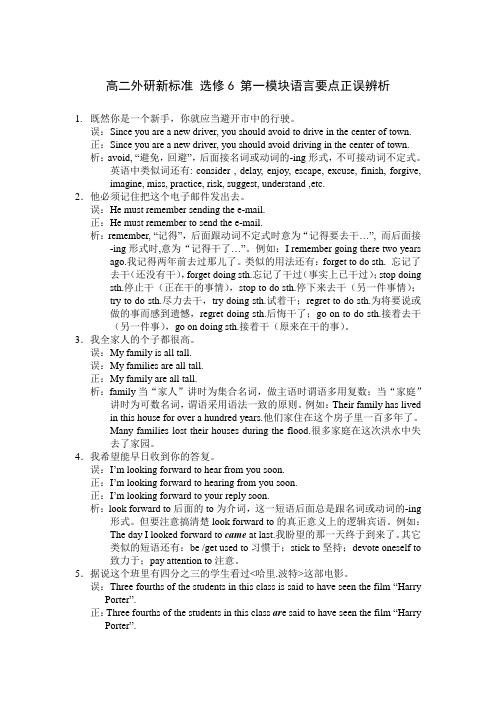
高二外研新标准选修6 第一模块语言要点正误辨析1.既然你是一个新手,你就应当避开市中的行驶。
误:Since you are a new driver, you should avoid to drive in the center of town.正:Since you are a new driver, you should avoid driving in the center of town.析:avoid, “避免,回避”,后面接名词或动词的-ing形式,不可接动词不定式。
英语中类似词还有: consider , delay, enjoy, escape, excuse, finish, forgive,imagine, miss, practice, risk, suggest, understand ,etc.2.他必须记住把这个电子邮件发出去。
误:He must remember sending the e-mail.正:He must remember to send the e-mail.析:remember, “记得”,后面跟动词不定式时意为“记得要去干…”, 而后面接-ing形式时,意为“记得干了…”。
例如:I remember going there two yearsago.我记得两年前去过那儿了。
类似的用法还有:forget to do sth. 忘记了去干(还没有干),forget doing sth.忘记了干过(事实上已干过);stop doingsth.停止干(正在干的事情),stop to do sth.停下来去干(另一件事情);try to do sth.尽力去干,try doing sth.试着干;regret to do sth.为将要说或做的事而感到遗憾,regret doing sth.后悔干了;go on to do sth.接着去干(另一件事),go on doing sth.接着干(原来在干的事)。
高中英语常见习惯用语正误辨析知识点分析全国通用

常见习惯用语正误辨析〔一〕知识概要由于英语国家的语言习惯与中国的语言习惯有许多不同之处,所以造成了许多同学在做选择或书写,或与人交谈中造成误用中国方式来对英语的问句作解答。
例如一个小女孩十分好看,可爱,外国人见到时会讲: You are so beautiful这时的答语应该是 Thank you如果外国人发现你的英语不错,他们会讲: Your English is very good这时中国人常常会说:不,我说的不好。
这纯是一种礼貌的答语,但是不符合英语习惯。
它正确的答语应是Thank you虽然交际英语有一些规律可讲,但更重要的是学习外国的生活习惯,了解他们的文化背景,历史渊源,这样才能真正的学好一门外语。
〔二〕正误辨析[误] - What can I do for you?- Yes, please help me[正] - What can I do for you?- I'd like to buy a sweater[析] What can I do for you? 这一问语实际上用于的情景很多,要根据具体情况而定。
如在商店中售货员讲这句话应译为:您想要点什么?在其他场合也可以被译为:我能为您做些什么?它的答语应是直接讲出想让对方提供的帮助。
[误] - Which colour do you like?- Sorry, I don't like[正] - Which colour do you like?- I prefer blue[析]由 which 来提问的问句是要回答具体的选择,而不能泛指,泛泛的回答。
如 Yes,I like it[误] Do you like to come with us tonight?[正] Would you like to come with us tonight?[析] Do you like …问的是对方的习惯,如: Do you like swimming? Do you like collecting stamps? 而 would you like …如此是一次性的邀请、提议。
高二英语选修六-Unit4-单元语法详解

Unit4 单元语法详解强调句型为了强调句子的某一成分(通常是主语、宾语或状语),常用强调句型:It is (was)+被强调部分+that (who) +其他成分。
如:Last night I saw a film in the Youth Palace.昨天晚上我在青少年宫看了一场电影。
强调主语:It was I that (who) saw a film in the Youth Palace last night.我昨天晚上在青少年宫看了一场电影。
强调宾语:It was a film that I saw in the Youth Palace last night.昨晚我在青少年宫看的是场电影。
强调地点状语:It was in the Youth Palace that I saw a film last night.昨晚在青少年宫我看了一场电影。
强调时间状语:It was last night that I saw a film in the Youth Palace.昨晚我在青少年宫看了一场电影。
另外,还要注意下列几点:(1)在强调主语时,who或that后的谓语动词要与被强调者保持人称和数的一致。
如:It is I who am a teacher.我是一名教师。
(2)即使被强调的主语是复数,也用it。
如:It is they who often help me with my lessons.常常在功课上帮助我的是他们。
(3)在强调时间、地点、原因或方式状语时,不能用when、where、why 或how,而要用that。
如:①It was because her mother was ill that she didn't go with us.因为她母亲生病了,她没有和我们一起去。
②It was only when I reread his poems recently that I began to appreciate their beauty.仅仅当我最近重读他的诗的时候,我才开始欣赏到它们的美。
选修六语法知识点总结

选修六语法知识点总结语法作为语言的基础,对于学习一门语言来说至关重要。
在英语学习中,语法知识是学习者必须要掌握的一部分,尤其是在高级阶段的学习中,更是如此。
在选修六课程中,学习者将会接触到更为深入和复杂的语法知识,因此需要对这些知识点进行总结和归纳,以便更好地学习和掌握。
本文将对选修六语法知识点进行总结,具体内容包括:定语从句、名词性从句、状语从句、虚拟语气、倒装句、插入语等内容。
通过对这些知识点的归纳总结,可以帮助学习者更加清晰地掌握这些语法知识,提高语言运用能力。
定语从句定语从句是修饰一个名词或代词的从句,用来对先行词进行进一步的解释或说明。
定语从句一般由关系代词或关系副词引导,常见的关系代词有:that, which, who, whom, whose 等;常见的关系副词有:when, where, why等。
定语从句的引导词有时可以省略,尤其是在非限制性定语从句中。
非限制性定语从句是指对先行词进行补充说明,而不是对其进行限定。
这时候,引导词可以省略,但是需要注意,如果省略引导词时,需要在引导词所在位置留下一个逗号,以示非限制性定语从句的结束。
名词性从句名词性从句是用来充当名词在句子中的成分,常见的有主语从句、宾语从句、表语从句和同位语从句。
主语从句:用来充当主语的从句,引导词一般为that, whether,if等。
宾语从句:用来充当宾语的从句,引导词通常为that, whether, if, what, who, whom, which 等。
表语从句:用来充当表语的从句,引导词通常为that, whether等。
同位语从句:用来与一些名词对等的从句,起到对名词进行解释、说明的作用。
名词性从句在英语中非常常见,掌握好名词性从句的用法对于语言的规范运用非常重要。
状语从句状语从句是用来充当状语从句的从句,用来说明主句中的时间、地点、原因、条件、目的、结果等情况。
状语从句的引导词有很多种,如:when, while, before, after, since, if, unless, although, as, because, so that等。
- 1、下载文档前请自行甄别文档内容的完整性,平台不提供额外的编辑、内容补充、找答案等附加服务。
- 2、"仅部分预览"的文档,不可在线预览部分如存在完整性等问题,可反馈申请退款(可完整预览的文档不适用该条件!)。
- 3、如文档侵犯您的权益,请联系客服反馈,我们会尽快为您处理(人工客服工作时间:9:00-18:30)。
Book 6 Module 1 语言要点正误辨析1.既然你是一个新手,你就应当避开市中的行驶。
误:Since you are a new driver, you should avoid to drive in the center of town.正:Since you are a new driver, you should avoid driving in the center of town.析:avoid, “避免,回避”,后面接名词或动词的-ing形式,不可接动词不定式。
英语中类似词还有: consider , delay, enjoy, escape, excuse, finish, forgive,imagine, miss, practice, risk, suggest, understand ,etc.2.他必须记住把这个电子邮件发出去。
误:He must remember sending the e-mail.正:He must remember to send the e-mail.析:remember, “记得”,后面跟动词不定式时意为“记得要去干…”, 而后面接-ing形式时,意为“记得干了…”。
例如:I remember going there two years ago.我记得两年前去过那儿了。
类似的用法还有:forget to do sth. 忘记了去干(还没有干),forget doing sth.忘记了干过(事实上已干过);stop doingsth.停止干(正在干的事情),stop to do sth.停下来去干(另一件事情);try to do sth.尽力去干,try doing sth.试着干;regret to do sth.为将要说或做的事而感到遗憾,regret doing sth.后悔干了;go on to do sth.接着去干(另一件事),go on doing sth.接着干(原来在干的事)。
3.我全家人的个子都很高。
误:My family is all tall.误:My families are all tall.正:My family are all tall.析:family当“家人”讲时为集合名词,做主语时谓语多用复数;当“家庭”讲时为可数名词,谓语采用语法一致的原则。
例如:Their family has lived inthis house for over a hundred years.他们家住在这个房子里一百多年了。
Many families lost their houses during the flood.很多家庭在这次洪水中失去了家园。
4.我希望能早日收到你的答复。
误:I’m looking forward to hear from you soon.正:I’m looking forward to hearing from you soon.正:I’m looking forward t o your reply soon.析:look forward to后面的to为介词,这一短语后面总是跟名词或动词的-ing 形式。
但要注意搞清楚look forward to的真正意义上的逻辑宾语。
例如:The day I looked forward to came at last.我盼望的那一天终于到来了。
其它类似的短语还有:be /get used to习惯于;stick to坚持;devote oneself to致力于;pay attention to注意。
5.据说这个班里有四分之三的学生看过<哈里.波特>这部电影。
误:Three fourths of the students in this class is said to have seen the film “Harry Porter”.正:Three fourths of the students in this class ar e said to have seen the film “Harry Porter”.析:“分数或百分数+名词+谓语动词…”,谓语动词数的形式要视名词中心词而定。
例如:One third of the fruit is bad.60% of the population here are workers.6.你认识一个叫海伦.布朗的小女孩吗?误:Do you know a little girl is called Helen Brown?误:Do you know a little girl calling Helen Brown?正:Do you know a little girl called/named Helen Brown?析:called / named Helen Brown为过去分词短语做定语修饰a little girl, 相当于定语从句who is called/named Helen Brown或whose name is Helen Brown。
7.来到这里三个月了,她已习惯了早上五点起床。
误:She has been here for 3 months and has been used to get up at 5:30 a.m.正:She has been here for 3 months and has been used to getting up at 5:30 a.m.析:be/get used to ,”习惯于…的”,后接名词或动词的-ing形式;而used to表示“事物过去经常或有规律的发生”. Eg: We used to swim in the river every day when we were children.我们小的时候天天在这条河里游泳。
8.伦敦人要听懂来自格拉斯哥的苏格兰人的话比理解纽约人的英语更困难。
误:A Londoner has more difficulty to understand a Scotsman from Glasgow than understand a New Yorker.正:A Londoner has more difficulty understanding a Scotsman from Glasgow than understanding a New Yorker.正:A Londoner has more trouble understanding a Scotsman from Glasgow than understanding a New Yorker.析:have (no/a little/much/great) difficulty/trouble (in) doing sth.做某事有(没有,一点儿,很多,巨大)的困难。
再如:Having been ill in bed for nearlya month, he had great difficulty passing the exam.病了将近一个月,他很难考试及格。
9.我在你这个年龄时就不得不努力工作。
误:I must work hard when I was your age.正:I had to work hard when I was your age.析:have to的含义与must相似,两者往往可以互换使用,但have to有各种形式,随have的变化而变化,往往强调客观需要;must表说话人的主观看法。
Eg: The film is boring, I really must go now. 这部电影没有意思,我真的要走了。
10.我宁愿和你们一起参加科研工作,也不愿到海滨度假。
误:I prefer to join you in research work rather than to go on holiday to the seaside.正:I prefer to join you in research work rather than go on holiday to the seaside.正:I would rather join you in research work than go on holiday to the seaside.正:Rather than go on holiday to the seaside, I prefer to join you in research work to the seaside.析:”prefer to do…rather than do…”, “would rather do sth…than do”表主观上的选择,“宁愿…也不愿…”, 注意其后的动词不定式符号的省略..11.我简直不能想象彼得一个人横穿大西洋的情景。
误:I can hardly imagine Peter sail across the Atlantic.正:I can hardly imagine Peter sailing across the Atlantic.析:imagine, suggest, appreciate等动词后接-ing形式,有时-ing形式前可加一代词或名词做它的逻辑主语。
Eg: I would appreciate your calling backthis evening..今晚你能打电话来我将非常感谢!12.父亲对我强调了勤奋的重要意义。
误:My father impressed me the value of hard work .正:My father impressed on me the value of hard work析:impress on sb.,“使…印象深刻”, 在被动语态里,后用介词”by, with”。
例如:The audience were most impressed by/with his excellentperformance.His excellent performance gave/made me a strong impression on hisaudience.他精彩的表演给观众留下了深刻的印象。
13.政府十之八九将在下届大选中失败。
误:It is true that the government will lose the next election..正:It is certain that the government will lose the next election..正:I believe it certain that the government will lose the next election析:表示某事肯定会发生时,在句型“It is certain that” 或”I believe it certain that…”句型中只能用certain,不能用sure。
